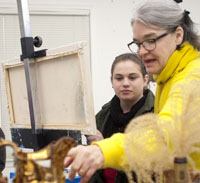Why I Give: Q&A With John and Margie Roberts Johnson '59

Margie Roberts Johnson '59 with her husband, John
Tell us a little about your lives today.
John and I moved to a retirement community near Roanoke, Virginia, about a year ago. Our daughter and her family live nearby, and our son and family live in Nashville. I enjoyed a career as an Episcopal church choirmaster-organist in Morristown, Tennessee; that work began as I majored in organ at Randolph-Macon Woman's College and played for required chapel in Smith Auditorium! Throughout our residence in Montreat, North Carolina, for 10 years, I subbed in several Asheville churches and now have practice opportunities at Christ Church Roanoke. John retired from careers in a family petroleum distribution business and as mayor of our East Tennessee hometown. He is now the committed driver of an all-electric car as we watch with dismay the change in our climate—an interesting irony for a former Shell Oil distributor. We are the devoted grandparents of five granddaughters and a grandson.
What is your fondest memory at college?
My fondest memory, other than the obvious joys of friendships, remains the closeness to faculty and administration to a small-town student as she found her way amid classmates from larger worlds. They were kind, encouraging, respectful and never dismissive. They helped me develop those qualities of leadership, which were crucial in my professional life. I look back with awe and gratitude at those relationships. As I read current material from the College, I realize that these relationships remain a cherished part of life on the campus.
Why do you choose to support the College?
Through financial crisis and change, Randolph College has found a new voice. That voice is informed about the realities of a new generation and seeks to meet those needs. We can treasure the past, but we must move on. It has seemed to me that coeducation and the name-change did not have to be a negation of the mission of the college I love. John and I want it to succeed. We have come to know and admire the intellect and stability of Bradley Bateman and support his steady and informed guidance through difficult days.
Explain a little about why donating the required minimum distribution from your IRA is a good option for those who would like to support the College financially?
We encourage alumnae and alumni and others interested in Randolph College to explore with their financial advisors and accountants the possibility of donating the minimum distribution from their IRAs in support of the College. John and I have elected to support both of our colleges in this way for many years and have found it to be an effective mechanism with financial benefits for us, as well as for our colleges.
To learn more about ways to give, please contact the Planned Giving Office at 434-485-8050 or plannedgiving@randolphcollege.edu.

